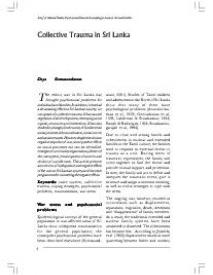Collective Trauma in Sri Lanka
The ethnic war in Sri Lanka has brought psychosocial problems for individuals and families. In addition, it has had a devastating effect on Sri Lankan society; we can speak of a collective trauma. It has caused regression of all development, destroying social capital, structures and institutions. It has also resultedin changes, for the worse, offundamental social processes like socialization, social norms and social networks. However, despite the obvious negative sequelae of war, some positive effects on social processes too can be identified: emergence community organizations, decline of the cast system, emancipation of women and decline of suicide rates. This article presents an overview of both positive and negative effects of the war on Sri Lankan society and discusses programmes for countering the negative effects.
Geachte bezoeker,
De informatie die u nu opvraagt, kan door psychotraumanet niet aan u worden getoond. Dit kan verschillende redenen hebben,
waarvan (bescherming van het) auteursrecht de meeste voorkomende is. Wanneer het mogelijk is om u door te verwijzen naar de bron
van deze informatie, dan ziet u hier onder een link naar die plek.
Als er geen link staat, kunt u contact opnemen met de bibliotheek,
die u verder op weg kan helpen.
Met vriendelijke groet,
Het psychotraumanet-team.
Reference:
Daya Somasundaram | 2003
In: Intervention: the international journal of mental health, psychosocial work and counselling in areas of armed conflict, ISSN 1571-8883 | 1 | 1 | 2-11
http://www.interventionjournal.com/sites/default/files/Somasundaram.pdf
In: Intervention: the international journal of mental health, psychosocial work and counselling in areas of armed conflict, ISSN 1571-8883 | 1 | 1 | 2-11
http://www.interventionjournal.com/sites/default/files/Somasundaram.pdf
Keywords:
Civil Warfare, Collective Traumatization, Coping Behavior, Females, Sri Lankans, War Neuroses


